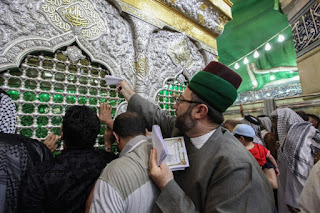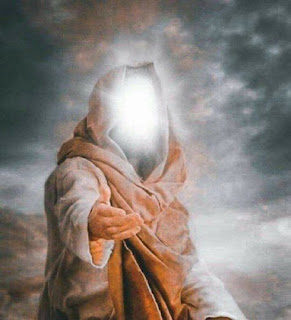Allama Majlisi Revived My People Part 4: Istighatha & Dua al-Tawassul
Allama Majlisi Revived My People Part 4: Istighatha & Dua al-Tawassul
Introduction:
The author critiquing Allama Majlisi had implied that directly invoking the Imams and istighatha is not a characteristic of duas in al-Kafi and early classical works, particularly the style of Dua al-Tawassul.
In the previous part of my series (part 3), I respond to this statement. And completely analyze the content of Dua al-Tawassul (why considering it a dua is justified, evidence of similar supplication in al-Kafi considered dua, etc).
However, I will share more ahadith in this post showing early duas from mainly early Shi’i sources (such as al-Kafi) and also canonical Sunni sources showing the style of Dua al-Tawassul is not strange. And one report in particular, will present a clear example of istighatha.
Let us begin
Bismillah
Body:
- Shi’i sources
- Al-Kafi
(Al-Kafi, volume 3, page 473)
When needing Rizq, pray two rak’at and then say the following:
“O Allah, I turn my face towards You by virtue of the intercession of Muhammad the Prophet of mercy.
O Muhammad, O Messenger of Allah. I turn my face through you to Allah - your Lord and my Lord that you [O Muhammad] send your blessings on Muhammad (i.e, on yourself) and his Ahlulbayt.
I ask you [O Muhammad] for a generous scent from your scent, and an easy change in my situation, and wide Rizq [provision] which I can speed up my matter, pay off my debt, and use it for my children.”
أتوجه إليك بمحمد نبيك نبي الرحمة، يا محمد يا رسول الله إني أتوجه بك إلى الله ربك وربي ورب كل شيء أن تصلي على محمد وأهل بيتهوأسألك نفحة كريمة من نفحاتك وفتحا يسيرا ورزقا واسعا، ألم به شعثي وأقضي به ديني وأستعين به على عيالي».
—
Mawla Muhammad Salih al-Mazandrani in his famous Sharh (explanation) of al-Kafi comments on this hadith saying:
“I turn my face through you to Allah - your Lord and my Lord that you [O Muhammad] send your blessings on Muhammad (i.e, on yourself).
This is linked to the statement “I turn my face to you [O Muhammad]”, and the reason why he asks intercession of [the Prophet] in the act of asking Allah to send his blessings upon - despite the fact already sends his blessings upon the Prophet.
This is definitely for [the supplicator] to display weakness and gravity of his situation, and to emphasize how his request when it comes from him alone [i.e, invoking Allah alone] would not be accepted without requesting the intercession of the Prophet.
And in some copies [of other scribes] regarding this hadith, “you [O Muhammad] send your blessings” is changed to “He [Allah] send his blessings].
Except the phrase ‘Upon Muhammad and his Ahlulbayt’ [suggests the opposite]. In fact, suggesting this phrase is to seek the blessings of the Prophet لقصد التبرك..”
ان (تصلي على محمد وال محمد) متعلق بقوله «أتوجه إليك» وإنما توسل بهم في طلب الصلاة عليهم مع أنه تعالى يصلي عليهم قطعالإظهار العجز والانكسار والإشعار بأن هذا الطلب من حيث أنه صدر منه لا يستحق القبول بدون التوسل بهم، وفي بعض النسخ «يصلي» على الغيبة وهو حينئذ متعلق بقوله: «يا محمد يا رسول الله إني أتوجه بك إلى الله» إلا أن في قوله:
«على محمد وأهل بيته» عدولا عن الخطاب إلى الغيبة لقصد التبرك أو الإستلذاذ أو الاهتمام هذا غاية الجهد في ربط هذه الفقرة بما قبلهفليتأمل.
—
Questions:
- Doesn’t the beginning of the portion about intercession in the hadith remind you of Dua al-Tawassul?
Hadith in al-Kafi:
أتوجه إليك بمحمد نبيك نبي الرحمة، يا محمد يا رسول الله إني أتوجه بك إلى الله
Dua al-Tawassul:
اَللّـهُمَّ إنّي اَسْاَلُكَ وَاَتَوَجَّهُ اِلَيْكَ بِنَبِيِّكَ نَبِيِّ الرَّحْمَةِ مُحَمَّد صَلَّى اللهُ عَلَيْهِ وَآلِهِ، يَا أَبَا الْقاسِمِ يَا رَسُولَ اللهِ يَا إِمامَ الرَّحْمَةِ يَا سَيِّدَناوَمَوْلانا إِنّا تَوَجَّهْنا وَاسْتَشْفَعْنا وَتَوَسَّلْنا بِكَ إلى اللهِ
- Does the latter part of the hadith suggests it is recommended to directly ask the Prophet for Rizq?
Yes indeed! This is confirmed by 2 ahadith in (al-Kafi, volume 6, page 295-296), one of which says:
“We were with Abi Abdilah [al-Sadiq], so he fed up.
Then we all raised our hands and said ‘Alhamdulilah’.
So Aba Abdilah [al-Sadiq] said:
‘Oh Allah, this [Rizq, that is the food] is from you and from Muhammad your Messenger. O Allah, to you is praise, send your blessings upon Muhammad and the family of Muhammad.”
22 - محمد بن يحيى، عن أحمد بن محمد، عن القاسم بن يحيى، عن جده الحسن بن راشد، عن ابن بكير قال: كنا عند أبي عبد الله عليهالسلام فأطعمنا ثم رفعنا أيدينا فقلنا:
" الحمد لله " فقال: أبو عبد الله عليه السلام: " اللهم هذا منك ومن محمد رسولك، اللهم لك الحمد صل على محمد وآل محمد ".
- What is the logic of asking Rizq from the Prophet? Doesn’t this contradict the Quran?
The following hadith in Kanz al-Fawa’id by al-Karajki clarifies:
‘They mentioned that Aba Hanifa ate food with Imam al-Sadiq, and when Imam al-Sadiq raised his hand from his food - he said:
‘Praise be to Allah - Lord of the worlds. Oh Allah, this [Rizq, that is the food] is from you and from Muhammad your Messenger.
So Abu Hanifa said: O Aba Abdilah [al-Sadiq], did you just associate a partner with Allah?!
So he [the Imam said]: Woe to you!
Allah says in his Book: “And they were not resentful except [for the fact] that Allah and His Messenger had enriched them of His bounty” (9:74)
And He says in another instance: “If only they had been satisfied with what Allah and His Messenger gave themand said, "Sufficient for us is Allah; Allah will give us of His bounty, and [so will] His Messenger; indeed, we are desirous toward Allah” (9:59)
So Abu Hanifa said: By Allah, it is as if I had never ever read these verses, nor read them, except at this time...”
كنز الفوائد للكراجكي: ذكروا أن أبا حنيفة أكل طعاما مع الإمام الصادق جعفر بن محمد عليهما الصلاة والسلام فلما رفع الصادق (عليهالسلام) يده من أكله قال: الحمد لله رب العالمين، اللهم هذا منك ومن رسولك (صلى الله عليه وآله)، فقال أبو حنيفة: يا أبا عبد الله أجعلت معالله شريكا؟! فقال (عليه السلام) له: ويلك إن الله تبارك يقول في كتابه: (وما نقموا إلا أن أغناهم الله ورسوله من فضله) ويقول عز وجل فيموضع آخر: (ولو أنهم رضوا ما آتهم الله ورسوله وقالوا حسبنا الله سيؤتينا الله من فضله ورسوله) فقال أبو حنيفة: والله لكأني ما قرأتهما قطمن كتاب الله ولا سمعتهما إلا في هذا الوقت. فقال أبو عبد الله (عليه السلام): بلى قد قرأتهما وسمعتهما ولكن الله تعالى أنزل فيك وفيأشباهك: (أم على قلوب أقفالها) وقال تعالى: (كلا بل ران على قلوبهم ما كانوا يكسبون)
—
- Other Shi’i sources, reports similar to Dua al-Tawassul:
- Man La Yahduruhu al-Faqih, by Shaykh al-Saduq:
(Man La Yahduruhu al-Faqih, volume 1, page 306) & al-Kafi
4355 / 10 - الصدوق في الفقيه: قال الصادق (عليه السلام): (إذا أردت أن تقوم إلى صلاة الليل، فقل: اللهم إني أتوجه إليك بنبيكنبي الرحمة وآله، وأقدمهم بين يدي حوائجي، فاجعلني بهم وجيها في الدنيا والآخرة، ومن المقربين، اللهم ارحمني بهم، ولا تعذبنيبهم، واهدني بهم، ولا تضلني بهم، وارزقني بهم، ولا تحرمني بهم، واقض لي حوائجي للدنيا والآخرة، انك على كل شئ قدير، وبكل شئ عليم
- Misbah al-Mutahajjid by Shaykh al-Tusi
(Misbah al-Mutahajjid, page 323)
وأتوجه إليك بنبيك نبي الرحمة محمد صلى الله عليه وآله، يا رسول الله إني أتوجه بك إلى الله ربك وربي لينجح بكطلبتي ويقضي بك حاجتي، اللهم صل على محمد وآل محمد و أنجح طلبتي واقض حاجتي بتوجهي إليك بنبيك محمد صلى الله عليهوآله.
- Sunni source:
(Sunan ibn Majah, Book 5, Hadith 583)
“It was narrated from ‘Uthman bin Hunaif that a blind man came to the Prophet (ﷺ) and said:
“Pray to Allah to heal me.” He said: “If you wish to store your reward for the Hereafter, that is better, or if you wish, I will supplicate for you.” He said: “Supplicate.” So he told him to perform ablution and do it well, and to pray two Rak’ah, and to say this supplication:
“Allahumma inni as’aluka wa atawajjahu ilaika bimuhammadin nabiyyir-rahmah. Ya Muhammadu inni qad tawajjahtu bika ila rabbi fi hajati hadhihi lituqda. Allahumma fashaffi’hu fiya (O Allah, I ask of You and I turn my face towards You by virtue of the intercession of Muhammad the Prophet of mercy.
O Muhammad, I have turned to my Lord by virtue of your intercession concerning this need of mine so that it may be met. O Allah, accept his intercession concerning me)”.
عَنْ عُثْمَانَ بْنِ حُنَيْفٍ، أَنَّ رَجُلاً، ضَرِيرَ الْبَصَرِ أَتَى النَّبِيَّ ـ صلى الله عليه وسلم ـ فَقَالَ ادْعُ اللَّهَ لِي أَنْ يُعَافِيَنِي . فَقَالَ " إِنْ شِئْتَ أَخَّرْتُ لَكَوَهُوَ خَيْرٌ وَإِنْ شِئْتَ دَعَوْتُ " . فَقَالَ ادْعُهْ . فَأَمَرَهُ أَنْ يَتَوَضَّأَ فَيُحْسِنَ وُضُوءَهُ وَيُصَلِّيَ رَكْعَتَيْنِ وَيَدْعُوَ بِهَذَا الدُّعَاءِ " اللَّهُمَّ إِنِّي أَسْأَلُكَ وَأَتَوَجَّهُإِلَيْكَ بِمُحَمَّدٍ نَبِيِّ الرَّحْمَةِ يَا مُحَمَّدُ إِنِّي قَدْ تَوَجَّهْتُ بِكَ إِلَى رَبِّي فِي حَاجَتِي هَذِهِ لِتُقْضَى اللَّهُمَّ فَشَفِّعْهُ فِيَّ " .
Conclusion:
The claim that invoking the Prophet directly in a spiritual act dedicated to Allah alone is not corroborated in early Shi’i sources is a deceptive and false claim. Not only is it corroborated in early Shi’i sources, but also a Sunni source.
Not only are there very early sources doing tawassul for the Prophet, but as I’ve shown the Kafi hadith which also asks for the Prophet’s Rizq.
May Allah guide us all
Wasalaam



